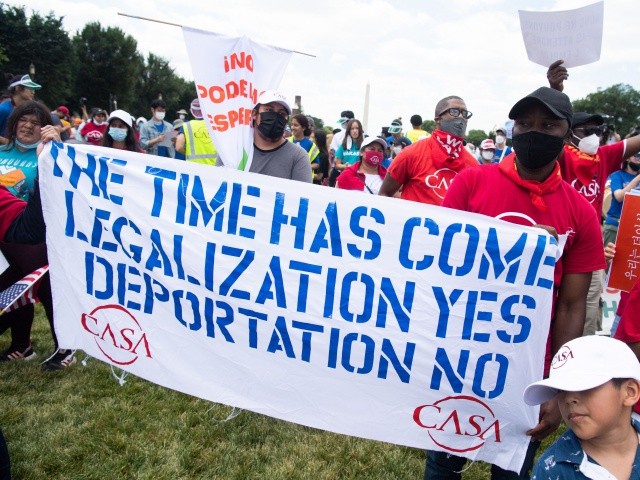American populations are repeatedly being replaced by migrants and the process is natural, routine, and renewing, says a May 17 op-ed in the New York Times.
The periodic population replacements are essential to the health of the State, wrote Bret Stephens, an op-ed columnist and a zealous advocate for greater economic migration
The phenomenon of [population] replacement, writ large, is America, and has been from the beginning, sometimes by force, mostly by choice. What the far right calls “replacement” is better described as renewal.
The column was posted as the newspaper’s journalists use the Tops marketplace massacre in New York to lash the growing public opposition to the government policy of mass migration. The public opposition, according to the newspaper’s reporters, is fueled by “a fringe conspiracy theory … [dubbed] Replacement theory.”
Other news outlets have also joined the argument to back mass migration against any and all opponents.
Stephens’ op-ed described five great population replacements — beginning with the wipeout of Indian tribes and continuing today with the population changes caused by the 1965 and 1990 immigration laws. He wrote:
The fifth [replacement] is the most contentious but also the most routine and unexceptional: the alleged replacement of the native-born white working class with a foreign-born nonwhite working class. In this telling, Washington policies, from the 1965 Immigration and Nationality Act to the 1994 North American Free Trade Agreement to current enforcement failures at the border, are part of a broad conspiracy to give American businesses cheap labor and Democratic politicians ready votes.
This is both nothing new and nothing at all. The United States has, from its earliest days, repeatedly “replaced” its working class with migrants, not as an act of substitution, much less as a sinister conspiracy, but as the natural result of upward mobility, the demands of a growing economy and the benefits of a growing population.
The prior replacements include the European takeover of the Indian-held continent, and then the gradual displacement of Protestant societies by waves of Catholic migrants.
The third replacement was caused by the arrival of non-English migrants from Ireland and mainland Europe, and the fourth replacement was the replacement of “WASP elites’ by arriving Jews, he said, adding: “To judge by enrollment figures at Brooklyn Tech or elite universities, the next generation of elites will also be immigrants or their children, many from South or East Asia.”
Stephen opposes populists and nationalists who expect their elites to favor the rights and welfare of their own nation, whether defined by geography or genetics. He smears the shared duty of citizenship as “blood-and-soil nationalism” or even as “white-identity politics” — despite the resulting benefits of mutual obligations, understandings, and civic trust.

Pro-immigration activists from organizations including CASA and the Center for Popular Democracy, hold a “WeCantWait” march to urge Congress to act on immigration reform. (SAUL LOEB/AFP via Getty Images)
Instead, Stephens wants a state built on a “sense of common destiny bound by ideals.”
But those vague ideals do not help strangers trust each other in the chaotic diversity of a resentful, multicultural society. Nor do they help ordinary Americans who fear they and their children are being discarded by the state’s desire for imported peoples.
Unsurprisingly, Stephens’ support for imposed diversity is commonplace in the New York Times. For example, a top New York Times editor, Jia Lynn Yang, has shown herself to be a fervent advocate for importing unsullied immigrants to redeem Americans’ homeland from Americans’ sins. In her 2020 pro-migration book, titled “One Mighty and Irresistible Tide,” Yang wrote:
The image of the Statue of Liberty, the Emma Lazarus poem at the statue’s base, the notion of America as an eternal “nation of immigrants,” — these make up an intoxicating part of this country’s mythology. Set against all the sins of America’s past — from slavery to the removal and genocide of American Indians — the arrival of open-hearted immigrants, grateful for a chance at a new life on our shores serves as a constant renewal of hope in the American project. If there is salvation for this country, it very well may lie in the underlying gratitude of a refugee whose life has been saved by the granting of a visa.
Yang’s parents migrated from Taiwan, and she wants to mobilize diverse migrants to transform America — quickly and permanently — regardless of Americans’ concerns:
For those Americans who want ethnic pluralism to be a foundation value of their nation, there is unfinished work. The current generation of immigrants and children of immigrants — like those who came before us — must articulate a new vision for the current era, one that embraces rather than elides how far America has drifted from its European roots. If [immigrants] do not [act], their opponents can simply point out to the America of the last fifty years as a demographic aberration, and they would not be wrong.
Extraction Migration
Since at least 1990, the D.C. establishment has extracted tens of millions of migrants and visa workers from poor countries to serve as legal or illegal workers, temporary workers, consumers, and renters for various U.S. investors and CEOs.
This economic strategy of Extraction Migration has no stopping point. It is brutal to ordinary Americans because it cuts their career opportunities, shrinks their salaries and wages, raises their housing costs, and has shoved at least ten million American men out of the labor force.
Extraction migration also distorts the economy and curbs Americans’ productivity, partly because it allows employers to use stoop labor instead of machines. Migration also reduces voters’ political clout, undermines employees’ workplace rights, and widens the regional wealth gaps between the Democrats’ big coastal states and the Republicans’ heartland and southern states.
An economy built on extraction migration also alienates young people and radicalizes Americans’ democratic, compromise-promoting civic culture because it allows wealthy elites to ignore despairing Americans at the bottom of society.
The policy is hidden behind a wide variety of excuses and explanations, such as the claim that the U.S. is a “Nation of Immigrants,” that Americans have a duty to accept foreign refugees, or that the state must renew itself by replacing populations. But the colonialism-like economic strategy also kills many migrants, exploits poor people, and splits foreign families as it extracts human-resources wealth from the poor home countries.
The economic policy is backed by progressives who wish to transform the U.S. from a society governed by European-origin civic culture into a progressive-led empire of competing identity groups. “We’re trying to become the first multiracial, multi-ethnic superpower in the world,” Rep. Rohit Khanna (D-CA) told the New York Times on March 21. “It will be an extraordinary achievement … we will ultimately triumph,” he boasted.

COMMENTS
Please let us know if you're having issues with commenting.